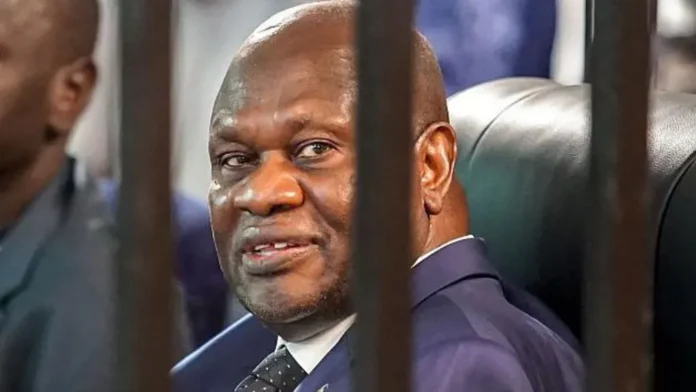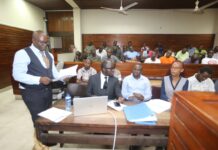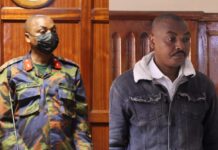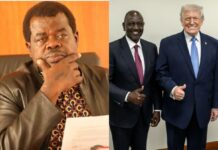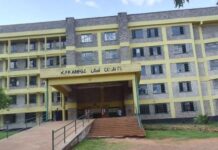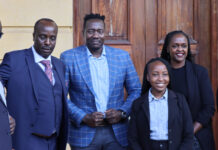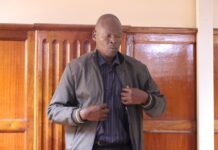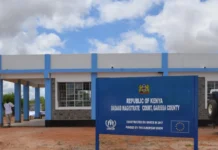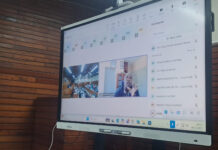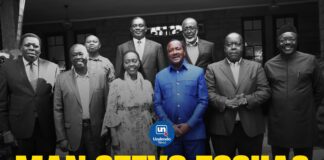A special court in South Sudan has ruled that it does have the jurisdiction to prosecute suspended Vice-President Riek Machar and seven co-accused, who are charged with murder, treason and crimes against humanity.
The court dismissed all objections by Machar’s legal team regarding its authority, the constitutionality of the proceedings, and the claim that he was immune from prosecution. The case will continue on Wednesday.
Machar has dismissed the charges brought against him two weeks ago as a political “witch-hunt”. They have raised fears of return to civil war.
The charges stem from an attack in March by a militia allegedly linked to Machar, which killed 250 soldiers and a general.
Since then, he has been under house arrest.
Machar’s defence team had argued that the alleged crimes should not be tried by a national court but by a hybrid court under the African Union, in accordance with the 2018 Peace Agreement that ended the five-year civil war between his forces and those loyal to President Salva Kiir.
Presiding Judge James Alala however said that the special court did have the authority to try national offences, as a hybrid court had not yet been established.
“The special court enjoys jurisdiction to try this case according to the Transitional Constitution 2011 as amended,” he said.
He also denied that Machar had immunity from prosecution, saying this was only enjoyed by the president.
“The First Vice-President does not have constitutional immunity, according to the transitional constitution,” the judge ruled.
The court also expelled two of Machar’s lawyers after the prosecution argued that they did not have valid licences.
The presiding judge ruled that the two could only participate once they have renewed their licences.
After the ruling, Machar’s SPLM-IO party said the entire case was “unconstitutional” – nothing more than a “rigged court case” and “sham trial” led by a “kangaroo court” that lacked “jurisdiction, legality and competence”.
It also alleged that the motives behind the trial were “tribal”.
Machar’s lead lawyer Geri Raimondo Legge Lubati told the court that his client and the co-accused had been “subjected to politicised media campaign” by ministers and other senior officials.
“This conduct amounts to unlawful and prior conviction of our accused and a blatant violation of the constitutional guarantee of presumption of innocence,” he said.
The charges have sparked fears of renewed conflict in the country, with the UN, African Union and neighbouring countries all calling for calm in the world’s newest country, which only gained independence from Sudan in 2011 following decades of war.Since then, he has been under house arrest.
Machar’s defence team had argued that the alleged crimes should not be tried by a national court but by a hybrid court under the African Union, in accordance with the 2018 Peace Agreement that ended the five-year civil war between his forces and those loyal to President Salva Kiir.
Presiding Judge James Alala however said that the special court did have the authority to try national offences, as a hybrid court had not yet been established.
“The special court enjoys jurisdiction to try this case according to the Transitional Constitution 2011 as amended,” he said.
He also denied that Machar had immunity from prosecution, saying this was only enjoyed by the president.
“The First Vice-President does not have constitutional immunity, according to the transitional constitution,” the judge ruled.
The court also expelled two of Machar’s lawyers after the prosecution argued that they did not have valid licences.
The presiding judge ruled that the two could only participate once they have renewed their licences.
After the ruling, Machar’s SPLM-IO party said the entire case was “unconstitutional” – nothing more than a “rigged court case” and “sham trial” led by a “kangaroo court” that lacked “jurisdiction, legality and competence”.
It also alleged that the motives behind the trial were “tribal”.
Machar’s lead lawyer Geri Raimondo Legge Lubati told the court that his client and the co-accused had been “subjected to politicised media campaign” by ministers and other senior officials.
“This conduct amounts to unlawful and prior conviction of our accused and a blatant violation of the constitutional guarantee of presumption of innocence,” he said.
The charges have sparked fears of renewed conflict in the country, with the UN, African Union and neighbouring countries all calling for calm in the world’s newest country, which only gained independence from Sudan in 2011 following decades of war.









